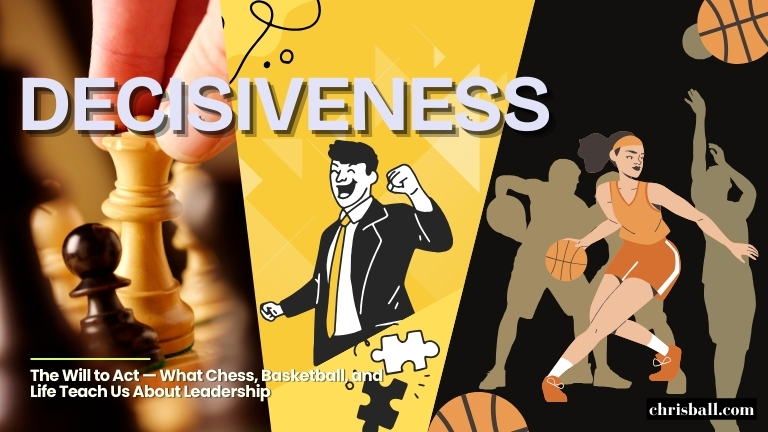We’ve all been there—standing at a crossroads, paralysed by options. Do you go left or right? Take the risk or play it safe? Speak up or stay quiet? Whether you’re running a business, managing a team, raising a family, or simply navigating life’s endless to-do list, you’re faced with one unrelenting demand: decide.
It’s tempting to believe that great leaders are simply born with the gift of decisiveness—those mythical creatures who just “know what to do” and fearlessly forge ahead. But here’s the truth: decisiveness is not about knowing all the answers. It’s about having the will to act, even when the path ahead is uncertain.
In Winning The Game, I dive deep into this principle because I’ve seen firsthand how it can shape not only the outcomes we experience but also the people we become in the process. Decisiveness isn’t about perfection—it’s about movement. Forward motion. Momentum.
And sometimes, the best way to understand leadership is not from a boardroom, but from a chessboard… or a basketball court.
Chess: The Power of the Calculated Move
When I was a teenager, I spent a few rainy afternoons playing chess with my grandfather. He wasn’t a grandmaster by any means, but he had this look in his eye—like every move mattered. I, on the other hand, would stare endlessly at the board, afraid to touch a piece. What if I made the wrong move?
One day, he leaned in and said, “You can’t win a game you don’t play.”
That moment stuck with me.
In chess, every decision requires foresight. You weigh the pros and cons, anticipate the consequences, and then—crucially—you make a move. You act. You don’t wait for perfect clarity. You gather enough information, trust your instincts, and push your piece forward.
Leadership is the same. You rarely get perfect conditions or total certainty. But what separates effective leaders from everyone else is their ability to evaluate the situation and then commit to a direction. They know that indecision is a decision in itself—and it often leads to stagnation, missed opportunities, or worse, a loss of credibility.
Rugby: Deciding at Full Speed
Now imagine the chaos of a rugby game. Thirty players flying across the pitch, half of them trying to stop you, thousands of fans screaming. You’ve got the ball. Do you pass? Kick? Drive forward? You’ve got seconds—sometimes milliseconds—to choose.
Decisiveness in rugby isn’t about long deliberation—it’s about training your instincts, trusting your preparation, and making confident choices at speed.
When I think of the modern workplace, or even family life, I often see it as a rugby game. So many things are happening at once. There’s pressure, distraction, and little time to pause. But that’s where your leadership grows—not by freezing, but by learning to act under pressure.
In Winning The Game, I emphasise the importance of both preparation and mindset. Like the best athletes, leaders must train their decision-making muscles before the pressure hits. They must be clear on their values, focused on their goals, and willing to take risks when the moment calls for it.
From Hesitation to Bold Action
You might be thinking, “But what if I make the wrong decision?”
You will. We all do.
But here’s the good news: failure doesn’t define a leader—how they respond does. In both chess and rugby, and in life, you’re always adjusting. You learn, pivot, and play the next move better. That’s the beauty of decisive leadership. It’s not rigid; it’s responsive.
And every decision you make sharpens your leadership edge. It teaches you to trust yourself, to take ownership, and to guide others with clarity. You stop waiting for permission, and instead, you become the person who gives direction. That’s powerful. That’s magnetic. That’s what people follow.
The Invisible Cost of Indecision
I’ve worked with brilliant people—talented, visionary, passionate—but stuck. Not because they lacked ideas or ability, but because they feared the consequences of choosing wrongly.
Here’s what they didn’t realise: indecision has a cost. It drains energy. It confuses your team. It causes opportunities to slip through your fingers.
Every moment spent wavering is a moment of lost momentum.
But decisiveness? It ignites action. Ev en imperfect decisions, when made with courage and follow-through, create learning, direction, and results.
So, How Do You Become More Decisive?
Start small. Build the habit.
- Make one quick decision each morning. Choose your most important task and commit to doing it—before breakfast.
- Stop waiting for all the information. Often, 70% is enough to act. Perfect data rarely exists.
- Reflect and adjust. Don’t fear a wrong move—fear standing still.
- Know your ‘why’. When you’re rooted in purpose, your decisions gain strength and clarity.
In Winning The Game, I walk you through how to build a decision-making framework that aligns with your values and goals. I help you shift from fearful hesitation to confident, purpose-led action—because that’s how games are won.
Be the One Who Moves
Leadership is a game played by those willing to act. Whether it’s a calculated move on a chessboard or a split-second pass on a rugby pitch, your willingness to decide and move shapes the future—for yourself and those you lead.
Don’t wait for perfect clarity. Don’t hide behind “I’m still thinking about it.”
Act.
Because at the end of the day, decisive action is the bridge between ideas and impact.
So go ahead—make your move. And if you need a guide along the way, Winning The Game is here to walk with you, helping you build the mindset, habits, and courage to lead boldly, live purposefully, and win on your terms.
Play on. 🎯
